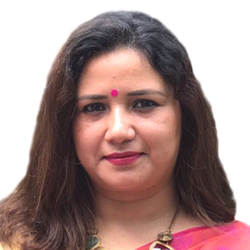Speaker Bio & Abstract

Geospatial Media and Communications
India
BiographyMegha is the Director for Global Development Agenda at Geospatial Media and Communications. In her role, she serves as the principal resource of Geospatial Media for the Global Development community forging partnerships and nurturing relationships with governments, multilateral and development organizations and NGOs to ensure that the value and utility of geospatial technologies reaches the last mile. Megha has been with Geospatial Media for over 15 years, contributing to the sector by communicating and co-developing geospatial domain conferences/programs concepts, reports, research and documentation, compiling case studies and presentations on geospatial technologies and its relevance for public good. She has been actively involved with stakeholders through organizing and conducting awareness workshops/roundtable meetings/seminars. She has undertaken research assignments for United Nations, European Commission and non-government organizations and has been part of several studies and research work related to mental health at university level and at All India Institute of Medical Science (AIIMS) and RAHI Foundation. Megha holds a Masterís Degree in Psychology from University of Delhi, India.AbstractCriticality of geospatial information for measuring, monitoring and realizing the Global Goals is well accepted and acknowledged even in the document - Transforming Our World, adopted by the Member States of United Nations which outlined the 17 Sustainable Development Goals. Geospatial Information also holds the potential to serve as the integrating force for all other digital data that can enable informed decision making, tracking, monitoring, reporting, resulting in better resource utilisation, taking timely action, reducing operational costs, improving workflow processes and many more such benefits for governments, businesses and people. However, most countries, especially the developing world still need to work upon the way geospatial information is integrated at national and sub-national levels for optimising on their investments into this technology. Taking cognizance of the critical need for effective management of geospatial information for delivery of 2030 Agenda, the Committee of Experts on Global Geospatial Information Management (UN-GGIM) has adopted an Integrated Geospatial Information Framework (IGIF) in August 2018. This integrated framework is to provide a basis and guide for Member States for developing and strengthening their national and sub-national arrangements in geospatial information management and related infrastructures. The Framework aims to translate concepts to practical implementation guidance for use by Member States through seven underpinning principles, providing eight goals and nine strategic pathways. The objective of the nine strategic pathways is to guide governments towards implementing integrated geospatial information systems in a way that will deliver a vision for sustainable social, economic and environmental development. The presentation will provide an overview of the IGIF supported by instances of geospatial information management in an integrated manner at national, sub-national levels through illustration of specific case studies.